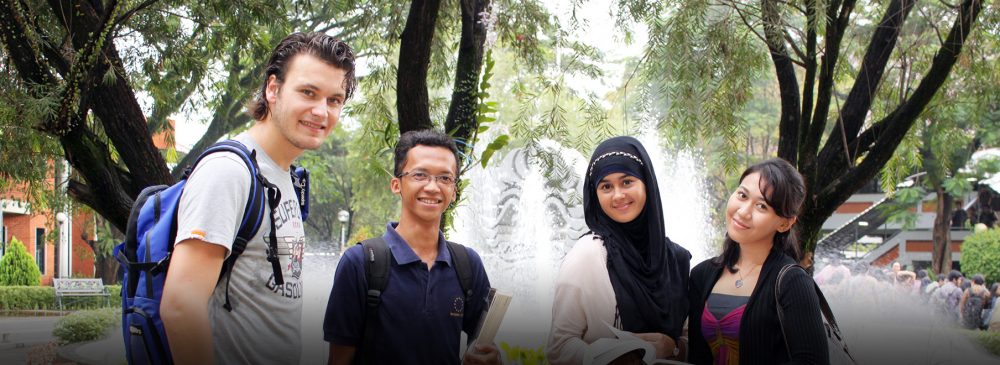
MEKK is a master’s program in applied economics under the Department of Economics (DIE), Faculty of Economics and Business, University of Indonesia (FEB UI).
Before being under the auspices of FEB UI, MEKK Study Program was managed under the University of Indonesia Postgraduate Program. It was known as the Master of Population and Employment Studies (S2KK) Study Program.
MEKK Study Program has been running since it was established in 1988 and obtained an Operational Permit Decree on September 25, 1993, with Decree 577/DIKTI/Kep/1993. In 2014, this study program was accredited A from BAN-PT after obtaining the A predicate.
S2KK was established by Prof. Kartomo Wirosuhardjo, Professor of the Faculty of Economics UI when he served as Deputy of Population at the Ministry of Population and Environment. Prof. Kartomo’s move continued the thoughts and Work of Prof. Widjojo Nitisastro, the Indonesian economic pioneer who founded the Demography Institute of FEUI in 1964. Both figures understood the importance of demography and population/labor for economic development and human welfare.
Due to scientific developments in Population and Employment, as of October 1, 2015, S2KK Study Program switched its management to under FEB UI based on the Decree of the Rector of UI Number 2254/SK/R/UI/2015 and changed its name to MEKK Study Program.
Master of Population and Labor Economics FEB UI is accredited “A” from the Higher Education Accreditation Board based on BAN-PT Decree No. 2519/SK/BAN-PT/Akred/M/VII/2019. The accreditation certificate is valid for 5 (five) years, from July 23, 2019, to July 23, 2024.
To become a leading learning center for demography, population economics, and employment in Indonesia that plays a role in national development and is internationally recognized.
The maximum study period is 6 (six) semesters and can be taken within 3 (three) semesters.
The MEKK Study Program offers the main competencies of graduate profiles who can evaluate demographic, population, and employment issues through an innovative research-based economic theory that is beneficial for scientific development. In addition, the application is for the benefit of Indonesia by upholding academic ethics and scientific integrity.
Semester 1
Semester 2
3rd semester
List of elective courses at MEKK
Demography
Demographic Techniques and Analysis 1
This course teaches about calculating demographic indicators (fertility, mortality, and migration) using population census data, population-based surveys, and population administration data applications.
Fertility, Mortality, and Family Planning
This course teaches theories and concepts for analyzing trends, differences, and behaviors related to fertility, contraceptive use, and mortality.
Demographic Techniques 2
This course teaches methods of calculating demographic indicators for incomplete data (indirect methods) and population projections.
Economics
Micro and Macro Economic Theory
Basic principles of economics, basic concepts of demand and supply, various output market structures, various labor market structures, externalities, concepts of comparative and absolute advantage, trade and labor, aggregate demand and supply, fiscal and monetary policy
Human Resource Economics and Labor Analysis
This course teaches concepts and applications of labor supply and demand, labor market, wages, HR investment, labor mobility, discrimination in the labor market, and unemployment.
Population Economics
Debate on economic and population growth, time allocation, the economics of fertility, education, health, and migration, and discussion of inequality, environment, gender, and disability issues with an economic approach.
Elective Courses
Generational Economics
The concept of generational economics, National Transfer Account (NTA), income calculation in the context of the economic life cycle, calculating public and private transfers, calculating asset-based reallocations, and generations in NTA: baby boomers, baby bust, and some applications of generational economics.
Health Economics
Demand and supply of health and health services, the role of Government in health services, evaluating the impact of health policies, recent issues such as the COVID-19 pandemic, the National Health Insurance System, health insurance for the aging population, and behavioral economics.
Business Demography
This course teaches the relationship between demography, human behavior, and business, especially regarding consumption and expenditure to meet the population’s needs.
Population and Employment Analysis Tools:
Supporting Courses
Econometrics
Learn applied econometric analysis techniques, from essential to advanced levels: Ordinary Least Square, multiple regression, Omitted Variable Bias (OVB), Conditional Independence Assumption and its applications, Propensity Score Matching, Double Difference Regression, panel data analysis.
Proposal and Seminar
They are facilitating students to prepare scientific research proposals, in-depth discussion of the feasibility of the topic in terms of research novelty (novelty), availability of data, the sophistication of methods, and stories that will be built.
Research Methodology
Scientific research preparation starts with finding research gaps, formulating research questions, quantitative survey methods, qualitative approaches, analysis, and scientific research presentation techniques; students practice it through mini-projects of mix-method studies.
Indonesian Development Forum
This course consists of public lectures on multidisciplinary topics inviting experts, practitioners, and Government.
Website: https://mekk.feb.ui.ac.id/
Address :
Master’s Program in Population and Employment Economics
Demographic Institute of the Faculty of Economics and Business, Universitas Indonesia
Nathanael Iskandar Building 3rd Floor
UI Depok Campus 16424
Telephone : +6221 7875107; 7872911 (hunting)
Facsimile : +6221 7872909
Email: passaat08@yahoo.com, passaat@gmail.com, mekk.feb@ui.ac.id
Academic Fee Download Brochure
